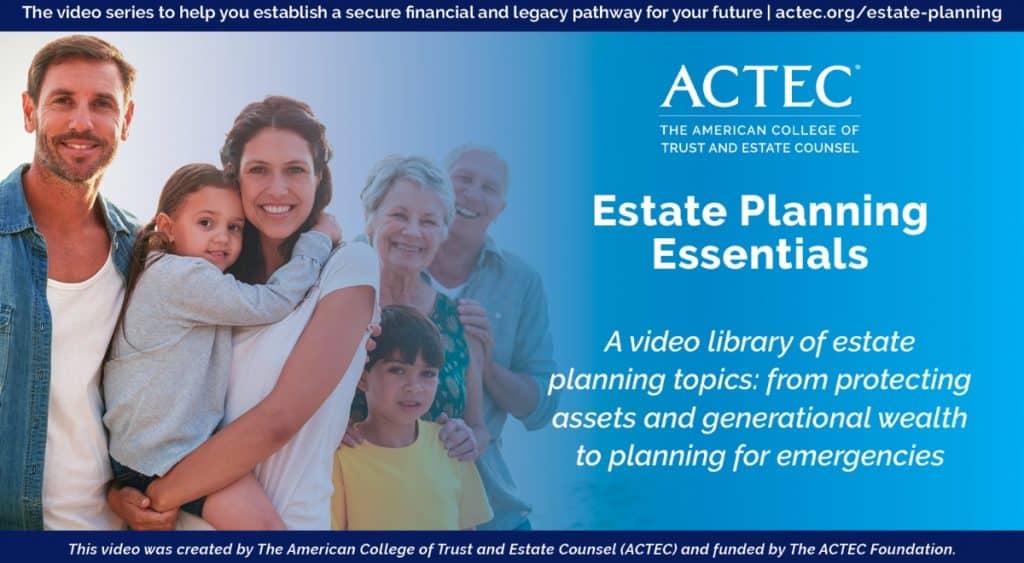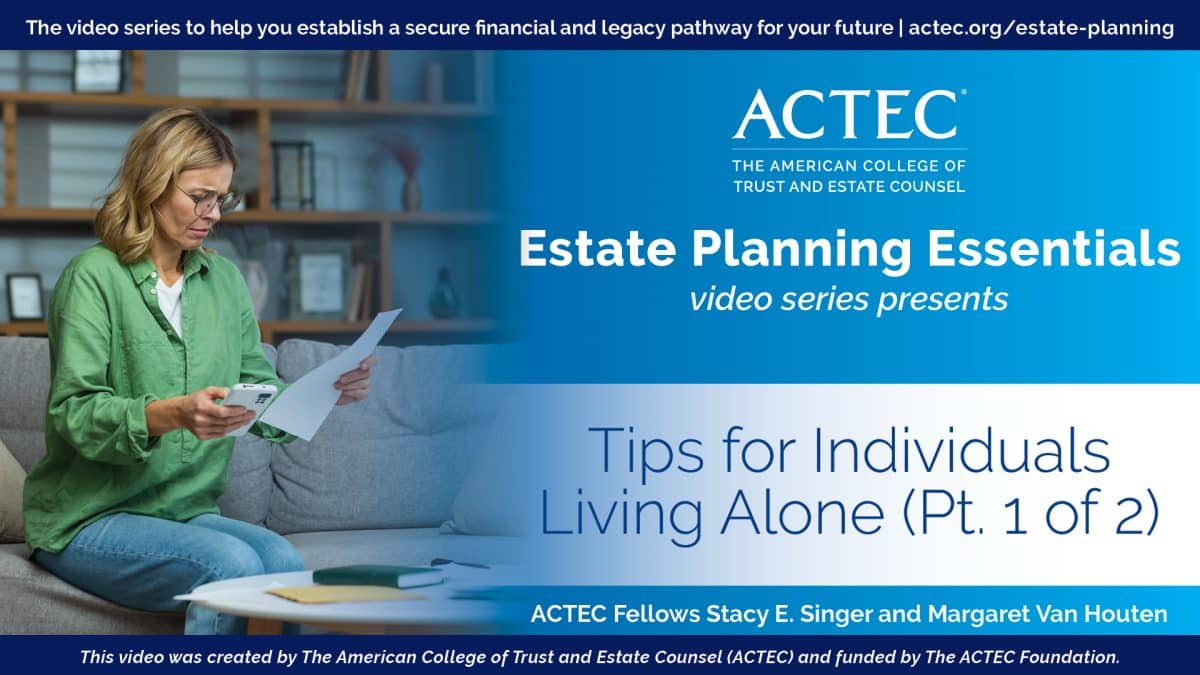It’s never easy to have end-of-life conversations with your loved ones. How do you talk with your parents about their estate planning documents, such as their will, power of attorneys, assets and healthcare proxies?
ACTEC Fellows Jean Gordon Carter and Linda Funke Johnson have a practical discussion on what estate planning documents need to be in place and difficult end-of-life decisions with parents. Presenters review critical estate documents, funeral arrangements, and how to get started.
Transcript
Hello, I’m Jean Carter, an ACTEC Fellow from Raleigh, North Carolina, and with me today is Linda Johnson, an ACTEC Fellow from Fuquay Varina, North Carolina. Our topic today is my parent’s estate planning, what matters to me, and how do I get them to do it? Linda, thank you for being here. Let’s start at the beginning.
Jean Carter: What are the most important documents for my parents to do for my benefit?
Critical Estate Planning Documents for Aging Parents
Linda Johnson: I think we need to approach this somewhat of a two-prong, two-basket, so we have to look at what’s most important while your parents are still alive and then after they’ve unfortunately passed away. To me, one of the most important documents is the Durable Power of Attorney. Definitionally, it’s the authority that you’re giving an agent to act on your behalf in financial and personal decision-making.
What we also have to decide when we’re drafting that document, and your parents will need to choose, who are the best candidates to be the agent: who is detail-oriented; doesn’t have a lot of their own financial issues going on; and someone that’s very trustworthy. That’s what they need to look at. And, also one other thing I quickly thought of is, if the parents are experiencing poor health, perhaps it’s not best to choose each other first. That’s a common thought but sometimes, depending on where we are in life, that’s not the best choice.
Then, we have to figure out if you need a short form of statutory Power of Attorney, or many planners will use these extensively long forms that cover every contingency that we could possibly think of, so we don’t have to go to court to have get the power for it.
Then, the Healthcare Power of Attorney is our next document. So when you are unable to make a decision on your behalf then we have to pick who you want to make healthcare decisions for you. Do you have family members that have health backgrounds that make really good decisions under pressure and who are not emotional? So that’s also a great discussion with your parent. Just a practical one is: find out if your parent has long-term care (insurance) because we have to be able to afford to pay for their care.
A more difficult discussion with them is going to be about end-of-life choices. We document that in either a living will or an advance directive, possibly a DNR (Do Not Resuscitate). It’s really important that you understand as the child what your parents want to happen at that time. I think that a HIPAA (Health Insurance Portability and Accountability Act) waiver needs to be done so that the agents- both types of agents in the Powers of Attorney- have access to medical records. And also, we need to consider, if your parents use a lot of digital assets, have they signed a digital asset consent form?
How to Discuss Funeral Arrangements with Your Parent
Another really tough discussion is the funeral. Nobody wants to talk about it because it’s just so emotional. And I might suggest that you tell your parent that you want to love them, you want to honor them, so please tell me what’s important to you for that very important last event. Do they want to be cremated? Would they like a burial? Can we go do a pre-need contract? Do they want to have a service? If they do, do they have any kind of favorite hymns, bible verses, flowers? They’re just very personal in nature, those questions, and so that’s why I thought it was important, but also too, do they have any important fun facts or accomplishments during their lifetime that they would like shared if you’re going to do an obituary? I think that’s a good thought.
Jean Carter: It’s a great suggestion on the funeral discussion. It certainly opens the discussion up to the family but it also gives them a chance to help me, the child, do what they want to do in a time that’s very difficult for the family. What about when they die? Do they need documents then?
Linda Johnson: I would say yes. So, I always consider a basic will first. It’s going to gather all the assets, pay all the expenses, and any debts out there. And then, we’re going to move the assets the way your parents want them to move. Another discussion we’ll have to have, just like the agent conversation, is who’s going to be best suited to be executor? It’s very methodical, who can gather all the assets, pay all the bills. And then, you need to understand, and your parents need to understand, where do they want the assets to go? And they have to share that with you.
One, I think, really important factor, is health challenges of either the parents, adult children, or grandchildren because that’s going to affect whether or not they should receive assets, if they should be in some form of a trust, and there’s a lot of very technical special rules for that. Another planning tool that’s often used is a Revocable Trust, but this is established during the lifetime and it’s going to gather all the assets, take care of the parents, and then after they’re done it may either distribute outright or in trust.
Planning for the Transfer of Assets
I think you need to talk about your parents is there anyone that they are concerned about who can’t handle money. Who is, perhaps, looking at a divorce? Do they have alcohol and drug addictions? Because those are really very important to make sure we understand. Now, there are retirement accounts and life insurance, they have beneficiary designations, so you need to go over those with your parents to make sure they’re properly filled out.
If you go to the bank or the brokerage house, you can fill out a pay on death, or a transfer on death account form, and then that they will not be governed by a will or trust. They will pay directly and avoid probate. If you haven’t done any of the above, then we’re going to disperse the estate by intestacy. Then, however your state defines who the heirs are, that’s how the assets will travel and I’ve had problems with minors inheriting real estate, a beneficiary who was on government benefits would inherit these assets outright and that disqualifies them for the benefits. They have to be qualified again when the money runs out. If I have somebody with drugs and alcohol, I’m really concerned about them getting assets outright. And then also, it makes for a much messier administration, and then it’s going to be more costly as well.
Jean Carter: I’m convinced. I’ve got to get them to do this stuff, but how do I get them to do it?
How to Talk to Your Parents About End-of-Life Issues
Linda Johnson: Well, I really understand the reluctance to interfere in your parents’ private matters but you might want to talk to them that you love them, you honor them, but they need to help you. They need to perhaps do a questionnaire, a checklist that has all the financial information, passwords, where things are located, where the documents are located, so you know where that is.
Share with them that you don’t want to appear greedy. It’s just that, you know, I want to focus on your end-of-life care, and this isn’t anything about what I’m going to inherit. You have often told me that you don’t want to be a burden as you get older, so now is the opportunity for you to tell me that you’re going to do this planning. You’re going to give me the information that I need to do my jobs.
Jean Carter: Linda this is great advice. Any final comments?
Linda Johnson: Well, I know sometimes, do we want to tell the kids about what we’re doing? Do we want to have a group meeting? And, I guess my thoughts are if you can’t get along for a holiday dinner you probably cannot have a group meeting. Although if we have a team of family and they all want to take care of Mom and Dad then it’s great to have a group meeting and spell it all out what your parents want. I think we also need to identify who are leaders in the family so that we can use that leadership skill to work with the parents and get the job done right.
Jean Carter: Linda, this has been great information. Thank you for helping me, help my parents.
Linda Johnson: Thank you.
Featured Video
Tips for Individuals Living Alone (Pt. 1 of 2)
Estate lawyers share tips for individuals living alone to prepare for a healthcare or medical emergency, including a checklist and contact forms in pt. 1 of 2.
ACTEC Estate Planning Essentials

ACTEC Fellows provide answers to frequently asked trust and estate planning questions in this video series.




